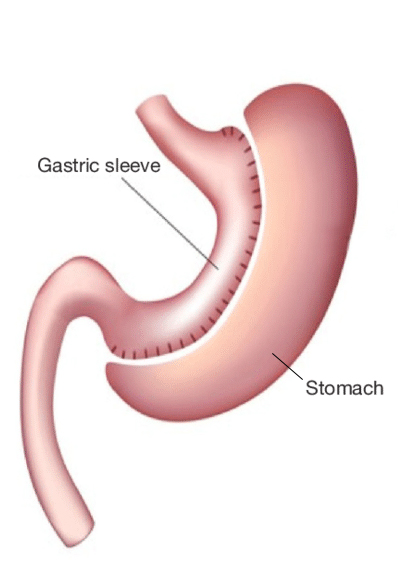 Vertical Sleeve Gastrectomy
Vertical Sleeve Gastrectomy
This surgery permanently removes a large part of the stomach. The part of the stomach that is left in your body becomes a long tube.
The tube is not as stretchy as the part of the stomach the surgeon takes out. Two years after surgery, patients usually lose about 65% - 68% of extra body weight.
Paying for Weight Loss Surgery
Weight loss surgery is an investment in your long-term health. Contact Patient Financial Services to make a payment plan today.
How Vertical Sleeve Gastrectomy Helps with Weight Loss
Sleeve gastrectomy causes weight loss in many ways. Because 3/4 of the stomach is removed, you will feel full more quickly when you eat. Like gastric bypass, this surgery lowers the amount of the hormone ghrelin in the intestine. This decreases your appetite.
Remember, the surgery will help, but you must make lasting changes to your food and exercise habits to lose weight and keep it off. This program gives you the tools to improve your health. We will encourage you to be successful.
Attend an Online Surgery Seminar
View our online surgical seminar to learn about UNMH Bariatric Surgical Process.
FAQs About Vertical Sleeve Gastrectomy
Unlike gastric bypass surgery, the surgeon does not make any changes to the small intestine. Food takes the same path as it did before surgery. It passes from the stomach into the small intestine. In comparison to the gastric bypass surgery, there is more pressure in the stomach. The stomach empties more quickly than before surgery.
The staples might leak: The surgeon will use staples on your stomach. A leak in the line of staples or one of the connections is a rare but serious problem that can happen shortly after surgery or within a few months. If it does, you may need more surgery or other procedures. A sleeve gastrectomy causes more pressure in the stomach, it is harder for the leak to heal.
Reflux or heartburn: If you have bad reflux or heartburn, sleeve gastrectomy may not be the right surgery for you. These problems can get worse or appear for the first time after a sleeve gastrectomy. If your reflux gets very severe after a sleeve gastrectomy and surgery and medicines aren’t helping, we may need to give you a gastric bypass surgery.
Your stomach twists or folds: This can cause a blockage and throwing up. If this happens, you may need more surgery.
Ulcers: Ulcers can form after the surgery. Smoking and taking anti-inflammatory medicines like Ibuprofen and Aleve increase your chance of getting ulcers.
You could have low levels of some vitamins: You could have low levels of some vitamins (vitamin deficiency): This might happen, but it’s less likely than with gastric bypass surgery.
If you adopt lifelong good habits in the first two years after surgery, you probably won’t regain much weight. Weight gain can occur between years two and six after surgery. How much is dependent on your eating habits.
Your weight loss will be fastest in the first six months after surgery. After that, your weight loss will slow down. After surgery, you might gain back some weight. The amount of weight you gain is different for every person. You might not gain any or you might gain all your weight back, but this is rare.
If you go back to bad habits, you’re more likely to regain some weight. Working closely with your health care team after surgery will help you continue to move toward your goals.
